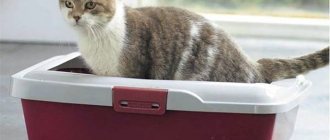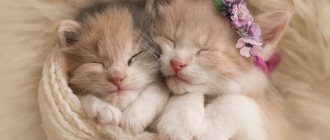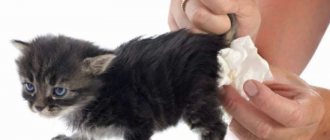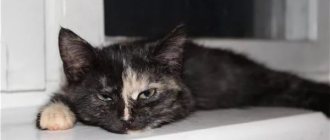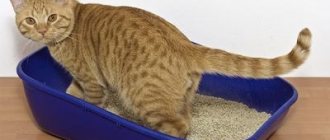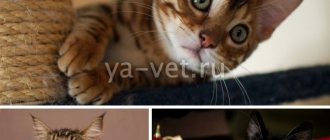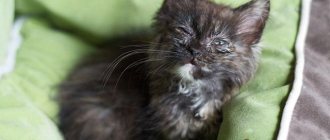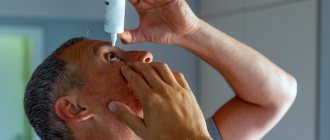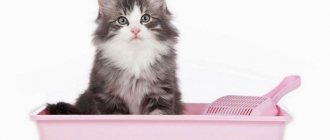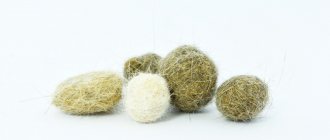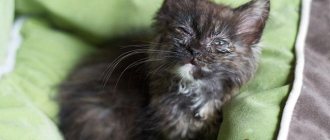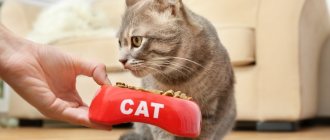Small kittens suffer from stool disorders much more often than their adult relatives. There are many factors that provoke diarrhea in a small kitten. This can be either a simple disorder due to an incorrectly selected diet, or the development of a dangerous infectious lesion that can lead to death without timely assistance.
Symptoms of diarrhea in kittens
Every cat owner should understand what stool disorder is. Diarrhea is a pathological process that develops in the digestive tract against the background of disorders. Diarrhea is characterized by increased frequency of bowel movements, and the stool becomes watery. Each bowel movement is accompanied by painful sensations in the abdomen, frequent and uncontrollable urge to defecate.
Diarrhea is not an independent disease. This is a signal from the body indicating the development of a pathological process. Diarrhea is most dangerous for small kittens. This is due to fast metabolic processes compared to adult animals.
In the shortest possible time, small kittens become dehydrated and their water-electrolyte balance is disturbed, which leads to death.
It is not at all difficult to understand that a small kitten is suffering from indigestion and has developed diarrhea. The main symptoms of diarrhea in a kitten are:
- depressed state;
- lack of appetite or complete refusal to feed;
- loose stools, long-lasting and painful;
- frequent urge to urinate;
- signs of dehydration (you can try to lift the baby by the scruff of the neck - if dehydrated, the skin takes a very long time to return to its place);
- impurities of undigested food particles in liquid feces;
- bloating and flatulence.
Visually, in addition to loose stool, the kitten’s condition is deteriorating sharply; the fur around the anus is wet, with particles of liquid feces stuck to it. The kitten is depressed and lies down more.
Additional "bells"
If loose stools appear, be sure to observe the cat.
If:
- Diarrhea is accompanied by vomiting;
- The cat often and forcefully licks its sides and belly;
- Sits hunched over, head down to front paws;
- Moans when changing position;
- Shortened, careful movements appeared;
- Does not respond to favorite food;
- Drinks water often and greedily;
- Reacts aggressively to attempts to pick him up;
- Tries to find a place in the shade and coolness;
- Urinates on himself;
- He falls on his side, throwing his head back.
Don't hesitate! Call the vet immediately: “The cat has diarrhea! What to do? What to give before your arrival? Step by step, please!
The doctor should receive all useful information from you:
- Age and sex of the animal.
- When and with what was the pet dewormed.
- When and what was vaccinated?
- Feeding regimen and what kind of food.
- What was treated for and with what (if any).
- Were antibiotics administered?
- When did the illness begin?
- When did the diarrhea start?
- What changes in the animal’s well-being have occurred over the last hour or two.
Your pet’s life is in danger, so do not hesitate to describe all the symptoms of the disease to the doctor in detail, including the color and quality of feces.
If the cat does not have such obvious signs of serious illness, then you can alleviate the symptoms of diarrhea using home methods.
Common causes of diarrhea in kittens
It is very important to understand what can cause diarrhea in a small kitten so that you know how to prevent such a disorder. The main factors that provoke stool upset in a small kitten are:
- Stressful conditions. Little kittens are still very attached to their mother cat, so early weaning, a sudden change of place of residence and a change of owner can cause serious stress for the baby.
- Diet disorder. When switching a kitten to adult food, diarrhea may occur. The reason may be not only a transfer to another type of food, but also an incorrectly selected diet. The kitten may be getting food from a human table or consuming too much food.
- Intoxication of the body. Both poisonous plants and low-quality food products can provoke poisoning in kittens. Often the cause of intoxication is the licking of various medications or other chemicals.
- A sharp decrease in blood sugar levels. A similar condition can occur in a small kitten due to eating too late or due to increased activity. Babies should receive food every 4 hours, in small portions.
- Helminthiases. Often the body of small kittens is affected by helminths. Infection most often occurs from the mother herself, who has not received antiparasitic treatment.
- Damage by protozoan microorganisms. Single-celled organisms infect the susceptible kitten’s body quite often. Common types of parasites can penetrate through infected water, food, and also the paws of a cat that cares for its offspring.
- Viral infections. Diarrhea in kittens can also be caused by viral diseases, such as coronavirus enteritis or feline panleukopenia. From the moment kittens are born, their immune system is very weak and is not able to actively fight various pathogens. Therefore, viral infections develop quickly in children, causing serious changes and capable of causing death.
Main causes of diarrhea
Diarrhea is the rapid passage of food through the digestive tract. There are quite a few reasons for this phenomenon:
- animal experience;
- nutritional errors;
- infection;
- parasites;
- allergy;
- fur accumulated in the stomach;
- sickness and poor health.
Let's look at each reason in more detail.
The emotional state of a small animal can tell on its digestion. This may be a reaction to a change of place of residence, the appearance of a new inhabitant or guest in the apartment, and especially gentle cats even react to a change in the tray and sleeping place that has become familiar.
Errors in diet planning definitely cause damage to health. Most often, owners worry about their pet and desperately overfeed it, especially by abusing cat treats. This also includes the kitten eating prohibited foods, such as smoked meats, spoiled food, or changing food.
Infections in the form of panleukopenia, coronavirus enteritis, toxoplasmosis and calicivirus can easily overcome a baby. But the stool will not tell you what exactly is to blame here; if an illness is suspected, the kitten is taken to the veterinarian.
The appearance of parasites in the body is also not uncommon. They can be brought in by people with food and land. Gradually there will be more and more of them, and the kitten will develop diarrhea as a reaction to intoxication of the body. Tape tapeworm and coccidia are especially guilty.
Allergies are also considered among the probable causes of loose stools. It could be your own fur or other irritants; it makes sense to visit a specialist at the veterinary clinic. Particular attention should be paid to kittens of the Somali cat, Pixie-Bob, Norwegian Forest, Maine Coon, Ragdoll: these long-haired beauties tend to swallow clumps of their fur.
When there are health problems, bowel dysfunction is the first thing that appears very often. These are viruses, chronic liver and kidney diseases, reduced immunity. This also includes diseases of the gastrointestinal tract, erosion and tumors.
If you have problems with the gastrointestinal tract, mucus can often be found in the stool.
Poisoning and antibiotic treatment are also factors that affect the quality of a kitten’s stool. First, the intestinal microflora is restored, and then it is observed whether the loose stools have disappeared.
How long can diarrhea last in kittens?
Diarrhea in a kitten can last until it ends with sad consequences. If the cause of diarrhea is a viral infection or intoxication, stool disorder provokes dehydration. Thus, diarrhea 2-3 times a day, lasting 3 days, can cause death.
The owner’s task is to immediately contact a veterinarian at the first signs of diarrhea in a small pet. The specialist will prescribe treatment depending on the reasons that provoked the pathological process and based on the general condition of the little patient.
Prevention
You can prevent diarrhea in a kitten by following simple rules:
- The diet must be balanced and contain only permitted foods. It is not allowed to feed animals table scraps, raw meat and fish, smoked or sweet.
- The kitten should be in a comfortable environment. You should not keep your pet in the same room with aggressive dogs and cats, and you should also not hit or scare it.
- Every pet must undergo up-to-date vaccinations. This will protect him from most dangerous infections and prevent possible infection of other animals and the owners themselves.
- Pets should be treated for parasites every six months.
- During a walk, you should not allow the kitten to drink water from a puddle or eat something from the ground.
Regular preventive examinations with a veterinarian and consultations on nutrition will also help maintain the health of your pets.
All information posted on the site is provided in accordance with the User Agreement and is not a direct instruction to action. We strongly recommend that before using any product, you must obtain a face-to-face consultation at an accredited veterinary clinic.
Causes of a bloated belly and diarrhea in a kitten
A bloated abdomen and flatulence, accompanied by diarrhea, are observed in kittens with a poor diet. Less commonly, the cause of a bloated abdomen and diarrhea is overeating. An owner's mistake is to give his pet adult cat food that he is not used to.
The presence of helminths can also become a factor provoking bloating. Untimely treatment for worms often causes serious disorders in the body of small kittens. A kitten's weakened body is not always able to cope with the negative effects of worms, which ends in death.
If you notice a bloated tummy, gas and diarrhea in your pet, you should not self-medicate. The best solution is to visit a veterinary hospital.
The specialist will conduct a thorough examination and prescribe the necessary tests to rule out the presence of serious diseases.
In case of overeating, the little patient is put on a special diet with clearly marked portions. Parasitic infestations require the administration of special anthelmintic drugs.
Bloody diarrhea in a kitten
Diarrhea with blood in small kittens is diagnosed quite rarely. But if you have diarrhea with blood, you cannot hesitate. It is necessary to seek help from a qualified doctor at the clinic as soon as possible.
The presence of blood in the stool is caused by erosive damage, ulcerative lesions and perforation of the intestinal walls. Diarrhea with red blood indicates serious problems in the small intestine. If there are streaks of scarlet blood in the diarrhea, this indicates a pathological condition in the large intestine.
You cannot do without the help of a veterinarian. A sick kitten must be treated under the supervision of doctors in a veterinary clinic. A specialist will be able to monitor the development of the pathological process, taking timely measures to eliminate them. It is very important to change your diet and administer intravenous solutions to prevent the development of dehydration.
Prevention of diarrhea
In order not to worry about what to give your cat for diarrhea if he is already sick, you need to follow basic hygiene rules for keeping pets:
- monitor the general condition of the cat;
- do not lose track of vaccinations and deworming;
- avoid interacting with unfamiliar cats (and you too!);
- monitor the quality of food;
- avoid stressful situations;
- wash your hands after cleaning the tray;
- Disinfect the tray and bowls with boiling water;
- carry out wet cleaning;
With attentive and responsible attitude towards your pet, all possible causes of diarrhea can be reduced to zero!
Diarrhea and vomiting in a kitten
Diarrhea in a small pet, accompanied by a symptom such as eruption of gastric contents, may indicate a pathology in the central nervous system. Inflammatory processes in the intestines and stomach can also be accompanied by diarrhea and vomiting, as well as pain in the abdominal area.
It is very important to distinguish attacks of coughing in a kitten from attacks of nausea. The cough is accompanied by chest work and rapid movements. But with nausea and subsequent eruption of gastric contents, a spasm occurs in the abdominal wall.
Vomiting and diarrhea in a small kitten can be treated at home. After this, you must urgently take your pet to a specialist for examination. Vomiting very quickly depletes the body, and in combination with diarrhea, there is a double blow to the body. The water-electrolyte balance is disturbed faster, dehydration occurs after 1-2 days and death. To stop vomiting, you can give your baby metoclopramide at a dosage of 0.1 mg per 1 kg. You can use the drug in the form of a solution, which is much more convenient, or in the form of injections.
Black diarrhea in a kitten
Normally, the color of feces, even slightly liquid ones, may be mustard-colored in a kitten. The danger is the appearance of black diarrhea. This type of feces is called melena and indicates serious disturbances in the functioning of internal organs.
The cause of black diarrhea in a kitten may be a large amount of raw meat in the diet or the addition of blood meal to the main meal. Black coloring of liquid feces can occur when iron supplements are added to the kitten's diet. The appearance of black diarrhea in a kitten is a reason to take your pet to the veterinarian.
Yellow diarrhea in a kitten
During normal functioning of the digestive system, bile secretion saturated with bilirubin enters the intestinal tract. The substance turns stool yellowish. When passing through the intestines, bilirubin, under the influence of biochemical reactions, is converted into stercobilin, which colors feces brown. If a kitten has yellow diarrhea, the cause may be:
- allergic reaction;
- helminthiases;
- milk protein intolerance;
- infectious lesions.
This is due to disturbances in peristalsis and problems in the general digestive process. It is worth remembering that the appearance of yellow diarrhea in a small kitten may indicate dangerous liver problems. Yellow diarrhea appears due to the fact that bilirubin does not have time to convert into stercobilin, which means that a number of biochemical reactions do not occur.
How can the color of stool change during diarrhea?
Information about the color of stool and its structure will help the doctor when making a diagnosis. Types of diarrhea:
- Watery stools of normal color occur with a sudden change in diet, and also occur due to stress. If bowel movements occur 2-3 times, there is no reason to worry.
- Yellow stool indicates that food is poorly digested. Orange color of feces indicates problems with the liver or gall bladder. If yellow diarrhea occurs in a kitten not for the first time, it is advisable to diagnose the internal organs.
- Green liquid feces are a sign of dysbiosis and putrefactive processes in the intestines.
- Black diarrhea indicates internal bleeding in the upper digestive tract.
- White diarrhea is a sign of gallbladder dysfunction. Discolored stool indicates that little bile is being produced.
- Diarrhea with mucus and blood. A large amount of mucus in feces occurs with helminthiasis. Bloody inclusions in the stool appear due to inflammation of the intestinal mucosa, as well as due to damage to its walls by a foreign body. Bacterial and viral infections also cause bloody diarrhea.
Green diarrhea in a kitten
Green diarrhea is a sign of an imbalance of microflora in the intestines. An organism affected by pathogenic microflora suffers from a number of disorders. In a small kitten, fermentation processes develop very quickly in the intestinal tract, inflammation occurs, which is expressed in the coloring of liquid feces green.
Not only a bacterial infection, but also allergic reactions can provoke green diarrhea in a cat. Often, green diarrhea due to dysbacteriosis occurs while taking systemic antimicrobial agents.
Causes of diarrhea in a newborn kitten
Diarrhea that appears once in a newborn kitten does not require outside intervention. The breeder or owner of a small kitten need not worry. But the appearance of several more episodes of diarrhea within a short time requires consulting a doctor. The most likely cause of diarrhea in recently born kittens is feeding with cow's milk.
The body of newborn babies lacks an enzymatic substance that promotes the breakdown of carbohydrates. As a result, the development of disorders and diarrhea in small kittens occurs, even death.
Some babies experience allergic reactions to the intake of milk protein in the body. The immune system recognizes them as foreign and begins to actively attack, which leads to serious disruptions in the functioning of the entire body.
In this regard, experts recommend introducing special mixtures, cat milk substitutes, into the kittens’ diet, without replacing them with cow’s milk or infant formula. Newborn babies are unusually sensitive to nutrition.
In kittens, diarrhea is often accompanied by the eruption of gastric contents, and this is fraught with the development of dehydration. The reason for this is viral infections and bacterial lesions. Infections always pose a danger to newborn babies, due to the rapid metabolic processes in the body of kittens.
Loose stools in a kitten, the reason is poor nutrition
Kittens have a sensitive digestive system. The disorder can be triggered by a change in diet, for example, when the baby is taken to a new home. Therefore, all foods unusual for the kitten should be given a little at a time, observing the reaction of the pet and its stomach. The transfer to a new industrial feed should be carried out in the same way. By the way, old, long-open, spoiled food can also cause diarrhea in a kitten. In addition, your furry baby may be allergic to certain products or components of finished food.
After six months, cats stop digesting milk, but sometimes small kittens do not tolerate this product well due to a lack of enzymes. Here is another possible cause of diarrhea. Overfeeding or underfeeding a kitten, various delicacies from the master's table, such as smoked sausage, low-quality or spoiled foods are also highly likely to lead to indigestion.
How do you understand that the cause is nutrition and not a serious illness? Based on the general condition of the pet. If, despite the diarrhea, he still plays happily, does not get worse, does not experience lethargy, food refusal, fever or other alarming symptoms, then you can try to solve the problem yourself. The diet and portion size should be adjusted according to the age of the kitten, and harmful treats should be excluded. You also need to understand what foods the animal does not tolerate well - just remove them one at a time from the kitten’s food and observe the reaction. Once you have identified the allergen, eliminate it from your diet forever.
What an owner should do when a kitten has diarrhea
Frequent and loose bowel movements in a kitten are a cause for concern for the owner. The kitten's owner should be especially alert to the uncharacteristic smell of feces and their color. The absence of an increase in body temperature and foreign impurities in the stool in the form of blood or mucus can be treated at home. But the best decision for the kitten owner is to see a doctor. When visiting a specialist, it is very important to provide the most detailed information about the baby’s nutrition and possible disorders before the onset of diarrhea.
If the cause of diarrhea in a kitten is a sudden transition from one type of food to another, for example, during weaning from the mother and the introduction of cow's milk into the diet, it is necessary to give the baby a decoction of rice - the liquid in which the cereal was cooked. It is forbidden to give products that the owner considers tasty in the form of sausage, fish or meat to the kitten.
You can stop diarrhea in a kitten by putting the baby on a starvation diet, but for no more than 12 hours. This action is applicable for kittens older than 1 month. Enterosorbents can be administered if the owner suspects a mild degree of poisoning. It is important to provide your pet with proper care - to relieve stress by providing more time for quiet time. Excessive stress and physical activity will not benefit the animal.
How to help a kitten at home
Treatment at home for diarrhea in small kittens can only be carried out in cases where the owner is sure that the diarrhea was caused by a nutritional disorder. In any other cases, you must seek help from a veterinarian.
Normal kitten stool is yellowish, mushy, and may have a mustard tint. In newborn babies, defecation, due to the peculiarities of the functioning of the intestinal tract, occurs up to 4 times a day. The appearance of stool of a foamy consistency, black or red in color, with a foul odor is not normal and requires treatment.
If you suspect the presence of pathogenic bacterial microflora in a baby, a course of antibiotics is recommended. For a viral infection, accompanied by fever, abdominal pain and a depressed state, antiviral drugs are prescribed. Accordingly, if helminth eggs are present in the feces, antiparasitic treatment is carried out. But appointments should be made exclusively by a specialist based on the data obtained from laboratory and instrumental studies. You can give small kittens Smecta, Polysorb or Enterosgel to quickly remove toxic substances formed as a result of disturbances in the functioning of internal organs. Loperamide, a human anti-diarrhea drug, may be used as an emergency treatment. To water a kitten, you can use Ringer-Locke solution and saline. Dosages are determined strictly by a veterinarian.
What medications are used to treat diarrhea in kittens?
You can stop your kitten's diarrhea with the help of medications. To eliminate loose stools, you can use the following medications:
- Activated carbon. A substance with absorbent properties. It is used only in mild cases of diarrhea in a kitten.
- Smecta is an excellent enterosorbent that cannot cause harm to the kitten’s body, but only with the correct dosage. It is worth noting that Smecta has adhesive properties. If you overdo it with the amount of the drug, you can cause constipation.
- Loperamide. A medicine intended for the treatment of diarrhea in humans. It is not the number one remedy for treating diarrhea in kittens, since the dosage is quite difficult to calculate.
- Enterosgel is a powerful enterosorbent developed specifically for humans, but has also found its use in veterinary medicine. The drug allows you to get rid of toxic substances during viral and bacterial infections, as well as a first aid remedy for intoxication of the body. An excellent effect can be expected at the very first signs of illness in a kitten.
- Antimicrobial agents. It is recommended that serious medications be prescribed by a veterinarian. Antibiotics have an inhibitory effect on pathogenic bacterial microflora.
How dangerous is diarrhea for kittens?
The main danger of diarrhea for a kitten's body is dehydration and the accumulation of toxins. Long-term lack of fluid in the body can cause death. During diarrhea, all useful substances leave the body along with feces. As a result, metabolism and salt balance are disrupted, and growth and development processes slow down.
A caring owner, having noticed yellow diarrhea in a kitten, should immediately consult a veterinarian, or better yet, take the animal to the clinic. For effective treatment, it is extremely important not only to stop diffuse diarrhea and replenish water loss, but also to identify the true cause of the disorder. The doctor will prescribe medicine for the kittens based on the test results. Self-treatment of pets is acceptable in case of short-term diarrhea without complications. But if one of the following symptoms is present, veterinary intervention becomes vital:
- bloody discharge and mucus are mixed with feces;
- diarrhea lasts more than a day;
- the consistency of stool is more like water;
- the kitten meows, screams, squeaks, or otherwise shows a feeling of pain;
- diarrhea accompanied by vomiting;
- the pet has a high temperature;
- The kitten is feverish and has convulsions.
Feeding a kitten with diarrhea
To stop diarrhea caused by improper nutrition in a kitten, it is necessary to keep the baby on a starvation diet. It is not recommended to keep your pet on a fasting diet for longer than 12 hours. A small and severely weakened animal must be fed by hand from a special bottle or pipette.
The owner’s main task is to prevent dehydration from developing. If the kitten is older, you can introduce low-fat food in the form of chicken broth and fermented milk products. It is allowed to introduce a boiled egg, rice porridge cooked in water, or minced chicken. Each dish should be introduced not in one day, but gradually.
The absence of positive dynamics in the animal’s condition requires immediate contact with a veterinary clinic.
Foul diarrhea
If the cat was treated with antibiotics, then there may be a side effect in the form of foul-smelling diarrhea. This is an indirect sign that the medicine was chosen incorrectly. The veterinarian should decide this.
Sometimes there are no antibiotics, but the diarrhea still smells bad. This means that the food is of poor quality; you need to help the baby with a little fasting.
